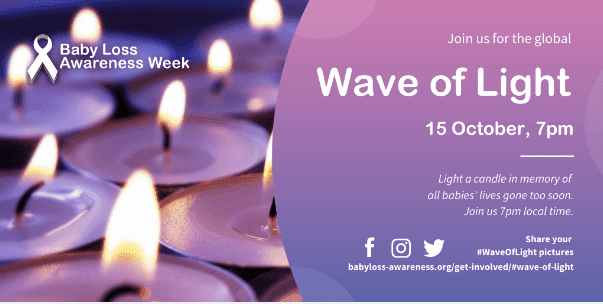
Grief is all the feelings you have when someone close to you dies. You may find it hard to believe that your baby died. You may want to shout or scream or cry. You may want to blame someone. Or you may want to hide under the covers and never come out. At times, your feelings may seem more than you can handle. You may feel sad, depressed, angry or guilty. You may get sick easily with colds and stomach aches and have trouble concentrating. All of these are part of grief.
When your baby dies from miscarriage, stillbirth or at or after birth, your hope of being a parent dies, too. Miscarriage is when a baby dies in the womb before 24 weeks of pregnancy; stillbirth is when a baby dies in the womb after 24 weeks of pregnancy. The dreams you had of holding your baby and watching him grow are gone. So much of what you wanted and planned for are lost. This can leave a large, empty space inside you. It may take a long time to heal this space.
The death of a baby is one of the most painful things that can happen to a family. You may never really get over your baby’s death. But you can move through your grief to healing. As time passes, your pain eases. You may grieve for your baby for a long time, maybe even your whole life. There’s no right amount of time to grieve. It takes as long as it takes for you. Over time, you can find peace and become ready to think about the future.
How do men and women grieve?
Everyone grieves in his own way. Men and women often show grief in different ways. Even if you and your partner agree on lots of things, you may feel and show your grief differently.
Different ways of dealing with grief may cause problems for you and your partner. For example, you may think your partner isn’t as upset about your baby’s death as you are. You may think he doesn’t care as much. This may make you angry. At the same time, your partner may feel that you’re too emotional. He may not want to hear about your feelings so often, and he may think you’ll never get over your grief. He also may feel left out of all the support you’re getting. Everyone may ask him how you’re doing but forget to ask how he’s doing.
You have a special bond with your baby during pregnancy. Your baby is very real to you. You may feel a strong attachment to your baby. Your partner may not feel as close to your baby during pregnancy. He doesn’t carry the baby in his body, so the baby may seem less real to him. He may become more attached to the baby later in pregnancy when he feels the baby kick or sees the baby on an ultrasound. Your partner may be more attached to your baby if she dies after birth.
How could pregnancy loss contribute to mental health problems?
Thinking lots of negative thoughts about yourself.
Negative thoughts about yourself can lead to low self-esteem. Having low self-esteem can be linked to mental health problems. It can also make it harder to ask for help.
Below are some examples of negative thoughts
• I ‘should’ be coping better.
• I ‘should’ be stronger or be able to offer more support to my partner.
• It was my fault.
• There’s something wrong with me.
• I have let people down
Thinking and worrying a lot.
Worrying a lot is exhausting and it can create negative thought patterns and change how you behave. It may also make it harder to focus on things that could help you feel better.
For example, you might be:
• wondering whether you could have prevented the loss
• pregnant again, reading all online advice about avoiding miscarriage
• worrying about conceiving or whether you will ever have children
• feeling as if you don’t have as much control over your life as you would like
Feeling lonely and isolated.
Loneliness and isolation can have a negative impact on your mental health. Baby loss can make you feel alone in different ways.
- Feeling physically isolated. You may feel unable to go out or see friends or family because it’s too difficult to see pregnant women or children. This might mean you miss out on valuable sources of comfort and support.
- Feeling as if no-one understands you. You might have lots of people around you but none of them seem to understand how you feel or care for you in the way you would like. It may feel particularly difficult if you don’t think your partner understands you.
Having an existing mental health problem.
If you live with a mental health problem already, you may find that pregnancy loss adds extra strain and makes it harder to cope.
Why don’t other people understand and how can you handle family and friends while you are grieving?
It can be hard to cope if people around you don’t understand how you are feeling or expect you to behave in a different way. You may feel criticised and in the wrong if people suggest you should be getting over your loss and moving on with life. When you are feeling low, insensitive reactions and words can hurt. But sometimes people simply don’t know what to say or do. And you may need to tell them how you feel and how they could help.
Here are some things you can do to help you handle others as you grieve. Do only what feels right for you:
- Tell them that their calls and visits are important to you.
- Decide if it’s OK for them to ask questions about what happened to your baby. If not, tell them you’re not ready to talk about it.
- Tell them it’s OK if they don’t know exactly what to say. Tell them that hearing honest words like, “I just don’t know what to say,” or “I want to help but I don’t know how,” can be comforting. People may say things that aren’t helpful to you like, “It’s for the best,” or “You can always have another baby.” Try to remember that they’re doing their best to support you, even if what they say is hurtful.
- Tell them exactly what you need. Do you just want them to spend time with you at home? Do you need someone to bring you a meal, shop for groceries, take your older children out or do your laundry? Tell them specific things they can do for you.
- If you want them to, ask them to use your baby’s name and to remember your baby. Tell them that even if you have other children, you won’t forget the baby who died.
- Thank them for their patience and support.
Some people may expect you to limit your grief or get over it in a certain amount of time. Take as long as you need to cope with your loss. Support from others may lessen over time. This doesn’t mean that they’ve forgotten about your baby or that they don’t care. You may need to tell them that you’re still grieving and that you still need their support.
How can you take care of yourself as you grieve?
Here’s what you can do to take care of yourself:
- Eating healthy food. Stay away from junk food and too many sweets.
- Do something active every day.
- Try to stick to a sleep schedule. Get up and go to bed at your usual times.
- Don’t drink alcohol (beer, wine, wine coolers and liquor) and drinks with caffeine in them, like coffee, sports drinks, tea and soda. Chocolate and some medicines also contain caffeine. Alcohol and caffeine can make you feel bad and make it hard for you to sleep. Instead, drink water or juice.
- Don’t smoke.
- Giving yourself time to grieve.
- Start a new skill or hobby.
- Get your feelings out in the open by talking or writing things down in letters.
- Being kind to yourself.
- Joining a support group.
- Commemorating your loss. A lot of people like to find a special way to remember their baby or to do something that makes them feel like they’ve said a proper goodbye.
Getting professional support for your mental health
It’s hard to admit you need extra support. It can feel quite daunting. You may find things difficult to talk about and hope your feelings will change on their own. Seeking help early can sometimes prevent your mental health from getting worse. Speaking to your GP is usually the first step as he can refer you to more specialised services including the Community Mental Health Clinics and Bereavement and Support Midwifery Services at Mater Dei Hospital.
Finding your way through the experience of baby loss and recovering from a mental health problem can be a long journey. You may find you never go back to how your life was before. Instead you’ll find a new normal. This might include learning more about your strengths and your vulnerabilities and building a ‘toolkit’ of coping mechanisms. It may not be a straightforward process but being kind to yourself, talking to people you trust and finding the right help can make a big difference.
Joining the Global Wave of Light
Baby Loss Awareness Week culminates with the global “Wave of Light” on 15th October, which is also a globally recognised event. We invite you to join other families across the world by lighting a candle at 7pm local time and leaving it burning for at least one hour to remember all babies that have died too soon. To join the virtual Wave of Light, take a photo of your candle and post it to Facebook, Twitter or Instagram using #WaveOfLight at 7pm local time. Wherever you do this, you will be joining a global ‘Wave of Light’ in memory of all the babies who lit up our lives for such a short time.

Local Support numbers
Bereavement & Support Midwifery Services, Mater Dei Hospital: 2545 4442 [email protected]
Community Mental Health Clinics
- Mtarfa: 21454917 / 21456758
- Mosta:21422969
- Qawra: 79266325
- Qormi: 21441317 / 21440170
- Floriana: 21220454 / 21250015
- Cospicua: 2397 2330 / 21662 088
- Paola: 21821566 / 21821562
Do you have an experience in relation to baby loss that you’d like to share with us at wham, either in your name or anonymously? Contact us or send us an email at [email protected]

Dr Edith Agius is a General Adult and Perinatal Psychiatrist. She completed a Masters degree with Sheffield Hallam University in Perinatal Mental Health. Currently, she is working at the Mosta and Qawra Community Mental Health Clinics and the Perinatal Mental Health Clinic based at Mater Dei. She is a committee member and serves the PRO role in the Parent-Infant Mental Health Alliance (NGO) and founder of the Instagram page Reproductive Psychiatry. She trained in VIG with the Association of Video Interactive Guidance UK and is now a VIG Accredited Practitioner.




